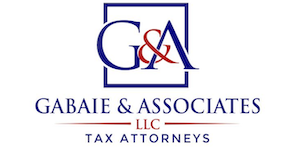Late filing, making mistakes on your taxes, or not paying your taxes on time can all be subject to fines, interest, and penalties. However, the most serious tax issues involve alleged tax fraud. Tax fraud not only carries higher penalties but it can also result in criminal charges. Additionally, there is no statute of limitations for tax fraud and the Internal Revenue Service (IRS) can come after a taxpayer years later based on fraud.
If you have any questions about possible tax fraud penalties, contact Juda Gabaie at Gabaie & Associates, LLC for help.
IRS Penalties for Fraud
Under IRC § 6663, “if any part of an underpayment of tax required to be shown on a return is due to fraud, there shall be added to the tax an amount equal to 75% of the portion of the underpayment which is attributable to fraud.”
Criminal Tax Fraud Charges
For individuals facing tax fraud allegations, in addition to any civil assessment, there are potential criminal charges. Criminal tax fraud is handled by federal prosecutors, not the IRS.
Under IRC § 7201, any person who willfully attempts to evade or defeat taxes can be charged with a felony, with penalties including up to $100,000 in fines ($500,000 in the case of a corporation), up to five years in prison, and the costs of prosecution.
Other criminal tax crimes may involve:
- IRC § 7202 - Willful failure to collect or pay over tax;
- IRC § 7203 - Willful failure to file a return, supply information, or pay tax
- IRC § 7204 - Fraudulent statement or failure to make statement to employees
- IRC § 7205 - Fraudulent withholding exemption certificate or failure to supply information
- IRC § 7206 - Fraud and false statements
Assisting someone in committing tax fraud can also result in criminal charges, as aiding or abetting tax fraud.
Conviction for Criminal Charges and Civil Penalty
The standard for a conviction of a tax crime is beyond a reasonable doubt. This standard is higher than the civil standard. This means that if someone is convicted of criminal tax fraud they may be collaterally estopped from denial of the civil fraud penalty under IRC § 6663.
Challenging Tax Fraud Penalties
There are a number of defenses and challenges to tax fraud penalties. In many cases, any failure to file or pay, or leaving income out of a tax return was done without the intent to defraud. The U.S. tax filing system can be very confusing and the tax laws do not always make common sense. It is only after getting a notice from the IRS about a tax dispute that a taxpayer may learn about their mistakes. Without the intent to defraud the government, a taxpayer should not have to face fraud penalties.
Another common situation involves a spouse who committed tax fraud without the other spouse knowing. This is so common, the IRS has “innocent spouse relief” for a spouse who gets caught up in tax fraud penalties and charges.
Questions About Tax Fraud or IRS Fraud Investigations
If you suspect the IRS may be investigating your taxes for alleged fraud or have questions about tax fraud in Maryland, contact Gabaie & Associates, LLC for a free consultation. You can contact Juda Gabaie online or call (410) 862-2198 for help with your IRS or Maryland tax issues.
